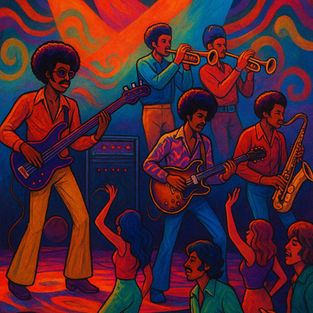
Photo- AI Generated
Black Sabbath and the Dawn of Heavy Metal in the 1970s
How a working-class band from Birmingham laid the foundation for Heavy Metal, a genre that shook the world.
30 September 2025
The 1970s were a period of innovation, unrest, and cultural revolution. Rock music, which had already become the soundtrack of young rebellion in the 1960s, was going to take on a darker, louder, and heavier tone. At the centre of this transition was Black Sabbath, a band from Birmingham, England, whose gritty sound and gloomy themes gave rise to heavy metal music that would not only dominate much of the decade but also leave an indelible global impact.
The Industrial Roots of Heavy Metal
Birmingham in the late 1960s was characterised by factories, smoke, and the clanging of equipment. This setting helped define the sounds of guitarist Tony Iommi, bassist Geezer Butler, drummer Bill Ward, and vocalist Ozzy Osbourne. Sabbath's threatening edge stemmed from Iommi's detuned guitar riffs, which were influenced in part by a workplace accident that cost him the tips of his fingers. The band's music felt like a reflection of their surroundings—gritty, industrial, and unfailingly raw.
When their self-titled debut album was published on February 13, 1970, it surprised both critics and audiences. Black Sabbath provided something altogether new, with songs steeped in occult imagery, doom-laden riffs, and a sense of foreboding that was far removed from the 1960s' peace-and-love mentality. It wasn't simply rock; it was heavy metal.
Defining Sound
Black Sabbath's first three albums, Black Sabbath (1970), Paranoid (1970), and Master of Reality (1971), are today regarded as heavy metal classics. Paranoid, with singles such as "Iron Man," "War Pigs," and the title track, catapulted the band to international prominence. Their sound was defined by slow, sludgy guitar riffs, thumping bass, and Ozzy Osbourne's eerie vocals, which gave the song an apocalyptic feel.
Sabbath's distinguishing feature was not volume or speed, but rather atmosphere. The dark, heavy tone of their music contrasted sharply with the joyful vibes of contemporaries such as Led Zeppelin and Deep Purple, despite the fact that both bands contributed to the evolution of hard rock and metal. Sabbath embraced the macabre, establishing heavy metal as the sound of rebellion, danger, and outsider culture.
Beyond Black Sabbath: The Rise of Metal
Although Black Sabbath were indisputable pioneers, they were not alone. In the 1970s, Birmingham-based bands such as Judas Priest took metal in new ways. Whereas Sabbath emphasised doom and gloom, Priest focused on precision, speed, and leather-clad theatricality. Their twin-guitar onslaught established a defining blueprint for the genre, influencing other bands in the decades since.
Meanwhile, bands like UFO, Scorpions, and Rainbow added their own embellishments to the sound, demonstrating that heavy metal wasn't a one-band phenomenon, but rather a movement that swept across the UK, Europe, and finally the US. By the conclusion of the decade, the foundation had been built for the explosion of metal subgenres that would define the 1980s, ranging from thrash and glam to death and black metal.
Cultural Impact
Heavy metal in the 1970s was more than simply music; it was a social statement. Fans, who were frequently labelled as outsiders or misfits, found consolation in the harsh music and ideas that addressed war, inequality, religion, and inner demons. Metalheads' long hair, leather jackets, and denim outfits became emblems of defying mainstream conventions.
Black Sabbath, in particular, became a lightning source of controversy. Their use of occult imagery and gloomy lyrics sparked suspicions of Satanism, even though the band frequently exploited those themes for social satire. Rather than promoting evil, Sabbath's music frequently warned against it, reflecting the fears of a world dealing with the Vietnam War, Cold War tensions, and societal instability.
The Legacy of the Seventies
By the conclusion of the decade, heavy metal had solidified its position as the dominant force in popular culture. Despite internal problems and band changes, Black Sabbath remained the genre's cornerstone. Their influence stretched beyond music, shaping fashion, visual styles, and even literature with darker, fantasy themes.
Heavy metal symbolised the disenchantment of the 1970s, even though the counterculture movement began with optimism. Where flower power faded, the thunder of distorted guitars and pounding drums took over, giving voice to a generation seeking release. Black Sabbath kindled the spark, but heavy metal's fire would burn stronger and evolve for decades.









